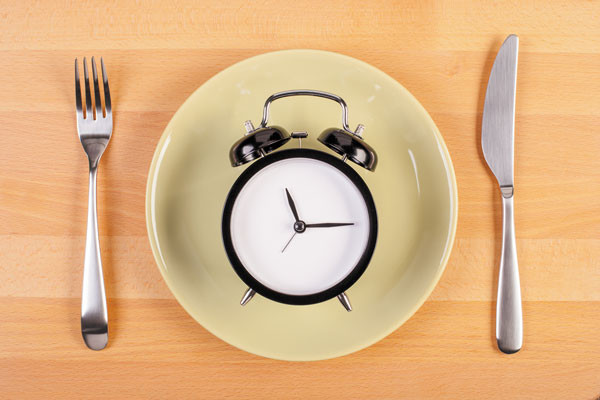
Respiratory health harms often follow flooding: Taking these steps can help

Tips to leverage neuroplasticity to maintain cognitive fitness as you age

Can white noise really help you sleep better?

Celiac disease: Exploring four myths

What is prostatitis and how is it treated?

What is Cushing syndrome?

Exercises to relieve joint pain

Think your child has ADHD? What your pediatrician can do

Foam roller: Could you benefit from this massage tool?

Stepping up activity if winter slowed you down
Diet & Weight Loss Archive
Articles
When You Visit Your Doctor - Lactose Intolerance
Lactose Intolerance
Questions to Discuss with Your Doctor:
- Do you have rumbling abdominal sounds after eating milk products?
- Do you get abdominal cramps, bloating, or diarrhea after eating milk products?
- Can you tolerate small amounts of milk?
- Do your symptoms improve when you eliminate milk products from your diet?
Your Doctor Might Examine the Following Body Structures or Functions:
- Careful abdominal exam
- Rectal exam
Your Doctor Might Order the Following Lab Tests or Studies:
- Trial of elimination of milk products from the diet
- Hydrogen breath test
- Lactose tolerance test
The dangers of the herb ephedra
After the death of Baltimore Orioles pitcher Steve Bechler more than 10 years ago, many questions arose about the safety of ephedra and the government's role in regulating the herb. Bechler died of heat stroke while taking ephedra, which occurs naturally in the Chinese herb ma huang. The speed-like drug contains the chemical ephedrine, an amphetamine-like compound closely related to adrenaline. Athletes and average people alike started taking ephedra when word started spreading about its ability to aid weight loss and increase energy and alertness.
But just because a supplement comes from natural sources doesn't make it safe. Ephedra can cause a quickened heartbeat and elevated blood pressure. Side effects include heart palpitations, nausea, and vomiting. More than 800 dangerous reactions have been reported with use of the herb. These include heart attacks, strokes, seizures, and sudden deaths. According to a study in the Annals of Internal Medicine, ephedra products make up only 1% of herbal supplement sales in the U.S., but they are responsible for 62% of herb-related reports to poison-control centers.
Harvard researchers renew warnings about saturated fat and heart disease
Higher intake of saturated fats is associated with a 24% greater risk of coronary artery disease. Replacing 1% of those fats with the same amount of calories from unsaturated fats, whole grains, or plant proteins appears to reduce the risk of coronary artery disease.
Any benefits to intermittent fasting diets?
Ask the doctor
Image: bopa/Thinkstock
Q. I have read about diets that involve fasting for one day, followed by normal eating for the rest of the week. Are there any benefits to this kind of diet??
A. Most diets achieve weight loss through the same equation—a reduction in total daily calories consumed in relation to the calories needed to maintain your weight.
Should I restrict calories for longevity?
Some potential medicines appear capable, in animals, of producing the same changes in body chemistry that calorie restriction does.
Where the worst type of fat is hiding in supermarket foods
Trans fats are undeniably bad for health, and they're still in many foods.
Image: GPointsStudio/Thinkstock
Lurking on supermarket shelves, within colorful, seemingly harmless packages, is something that can cause serious harm to your health: trans fat. "No amount of trans fat is acceptable, from a health standpoint," says registered dietitian Kathy McManus, director of the Department of Nutrition at Harvard-affiliated Brigham and Women's Hospital.
About trans fat
Still a danger
Meanwhile, food manufacturers are allowed to use partially hydrogenated oils in their products, and so are restaurants. And if you're not savvy about reading Nutrition Facts labels, you may not detect the trans fat in your food. "The FDA doesn't require trans fat to be listed until there's a half gram or more per serving," explains McManus, "so the label may show zero grams of trans fat, even if a serving contains almost half a gram."
Are small amounts of trans fat dangerous? "It adds up, especially if you eat several foods with trans fat each day," says McManus. Based on FDA estimates, researchers at the CDC report it is possible that eliminating trans fats in the diet may prevent as many as 10,000 to 20,000 heart attacks and 3,000 to 7,000 deaths from heart disease each year.
Become a detective
What about other fats?
All fat is high in calories (nine calories per gram of fat, versus four calories per gram of carbohydrate, for example). A high-calorie diet can lead to weight gain, which can lead to chronic health problems.
An excess of saturated fats (such as those found in whole milk, butter, and red meat) can increase "bad" LDL cholesterol and lead to heart disease. Limit saturated fats to less than 7% of your total daily calories or less than 12 grams in a 1,500-calorie diet.
Some fats, within calorie limits, are good for you. Such "good" fats include monounsaturated fat (such as those in olive and canola oils, most nuts, peanut butter, and avocados) and polyunsaturated fat (for instance, in salmon, mackerel, walnuts, and safflower oil). Both are associated with lower LDL cholesterol and total cholesterol when substituted for saturated fats.
Surprising sources of trans fat that list 0 grams on the Nutrition Facts label | ||
Product type | Brand | Identifying ingredient |
Frozen fish fillets | Sea Cuisine Potato-Crusted Cod | Partially hydrogenated soybean oil |
Coffee drink mix | Hills Bros. Double Mocha Cappuccino | Partially hydrogenated coconut oil |
Breakfast cereal | Kellogg's Apple Jacks | Partially hydrogenated soy-bean and/or cottonseed oil |
Seasoned bread crumbs | Vigo | One or more partially hydrogenated oils (soybean, cottonseed, corn, canola) |
Weight training may boost brain power
Weight training improved mental performance in a study of 100 men and women ages 55 through 86 who had mild cognitive impairment.
Ask the doctor: Are activity trackers worthwhile for weight loss?
If wearing an activity tracker results in more daily exercise but not a significant weight loss, it still provides health benefits.
How to cut back on sugar and salt
Most Americans consume much more than the recommended levels of sugar and salt. However, you can retrain your palate to be satisfied with less of both.
Image: tsvibrav/iStock
If you own a sugar bowl and a saltshaker, you may be wondering if you should ever fill them again. The panelists crafting the 2015–2020 Dietary Guidelines for Americans emphasized that we're consuming much more sugar and salt than is healthy for us and have advised us to pare our intakes of both considerably. That said, they have acknowledged that the sugar bowl and saltshaker aren't the principal villains at the dining table. About 80% of the sugar and salt we eat is added to packaged and commercially prepared foods.
What are added sugars?
Reducing your sugar intake
Although beverages are the most important source of added sugars, they aren't the only ones. There are additional ways to reduce your intake of added sugars, and it doesn't have to mean giving up desserts. Here are several ideas for reducing the amount of sugar in your diet, targeting sugary drinks just as a first step:
Give your taste buds time to adjust. If you're in the habit of having two spoonful's of sugar in your coffee or tea, for instance, start by going to one-and-a-half for a week, then down to one. If sodas are part of your regular routine, cut your consumption by one a week, then two.
Adapt your recipes. You can make your favorite recipes less sugary by reducing a little bit at a time—try using one-quarter less sugar than the recipe calls for, then one-third—right up until you notice the difference. You may come to prefer the less-sweet variation.
Reach for fruit rather than juice. Squeezing fruit breaks down the cells and releases sugar into the juice, so that it enters the bloodstream more rapidly. Moreover, a glass of juice is usually the caloric equivalent of three whole fruits. Instead of drinking fruit juice, eat a piece of fresh fruit. You can make fruit drinkable and still preserve its fiber by blending it with almond milk or low-fat yogurt in a smoothie. If you just can't give up juice, make it 100% fruit juice that is not sweetened and limit the amount to a 4-ounce glass.
Check your cereal box. If you enjoy cold cereal or instant oatmeal for breakfast, look at the labels and choose one with minimal added sugar. It's also worth noting that cereals made with refined grains are quickly broken down into sugars in the body. To wean yourself off your favorite cereal, try combining it with a whole-grain, high-fiber cereal, and add fruit.
What about salt?
Cutting down on salt
Even if you ban salt from your table, it is still easy to exceed the sodium limit. To avoid doing so, try the following:
Eat mostly fresh foods. Most of the sodium we eat comes from restaurant meals and processed foods, including canned vegetables and soups, pasta sauces, frozen entrées, lunch meats, and snack foods. If you start with unsalted, fresh foods and prepare them yourself, you can exercise better control over your sodium intake.
Take care with condiments. Sodium is found in many condiments besides ordinary table salt—including soy sauce, Worcestershire sauce, salad dressings, ketchup, seasoned salts, pickles, and olives. Baking soda, baking powder, and monosodium glutamate (MSG) also contain sodium.
Read the labels. The Nutrition Facts label on packaged food lists milligrams of sodium per serving, so it's important to note how many servings the container holds. The percent daily value is based on 2,300 mg, so if your own daily sodium limit is lower, the amount of sodium in a serving is actually a higher percentage than the label indicates. Be aware that some over-the-counter drugs also contain sodium.
Speak up. When dining out, ask to have your food prepared with less salt. You can also ask for a lemon or lime wedge to add more flavor to your food.
Spice it up. Cut back on salt by using more herbs and spices like basil, coriander, cumin, cayenne, powdered mustard, oregano, rosemary, sage, thyme, and turmeric. You might try making your own blends of spices and herbs to use along with lemon or lime juice or flavored vinegars.
Seek out specialty salts. Some kosher and gourmet salts contain less sodium than standard iodized table salt; check the Nutrition Facts label to make sure.
The good news

Respiratory health harms often follow flooding: Taking these steps can help

Tips to leverage neuroplasticity to maintain cognitive fitness as you age

Can white noise really help you sleep better?

Celiac disease: Exploring four myths

What is prostatitis and how is it treated?

What is Cushing syndrome?

Exercises to relieve joint pain

Think your child has ADHD? What your pediatrician can do

Foam roller: Could you benefit from this massage tool?

Stepping up activity if winter slowed you down
Free Healthbeat Signup
Get the latest in health news delivered to your inbox!
Sign Up







